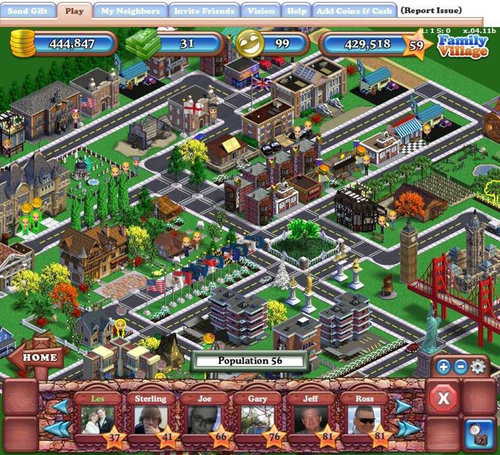How? with Family Village …
Where? on Facebook …
Answers of all question are it as a CityVille populated by your ancestors …
“This is not meant to be a genealogy game,†said Jeff Wells, the chief executive officer of Utah-based Funium. “It’s a game that incorporates genealogy.”
“We’re up to around 14,000 or 15,000 installs, which is relatively small in this environment. Our objective is millions,” he told me this week. Then, knowing my background, he invoked a metaphor close to my heart: “We’re pushing the shuttle to the launch pad.”
You may paid for genetic tests and document searches in hopes of uncovering more of your family roots. Also you may traveled south and north around world to check parish records, and riffled through countless rolls of microfilm looking for clues. May be you’ve never played a Facebook game, and you are not sure Family Village will get you started. But, I’m really sure after reading this post and play this game, you’ll be one of target audience for the game.
“It’s not supposed to do your genealogy,” said Wells, who previously served as the CEO of the GeneTree DNA testing company. “It just makes genealogy more interesting. This is meant for the masses. My intent is to get people who are disinterested in family history interested.”
Updating the family quest
In the pre-Facebook age, genealogy was traditionally ranked among the country’s most popular hobbies (right up there with stamp collecting). But today, online social networking takes up increasing amounts of leisure time. In February, comScore reported that the average Internet user spent more than four hours a month on social-media sites. In a sense, Family Village and similar genealogy apps (such as the popular “We’re Related” Facebook app) represent efforts to update the hobby for the 21st century.
“We have incorporated family history into the social gaming environment,” Wells said. “That’s the first time that’s been done.”
Family Village is also built to incorporate information from We’re Related, Family Link and other online genealogical resources. As you create game characters, you can add in data from your own genealogical records, about birth, death, marriage and all the other family-tree basics. The game platform is designed to suggest archived documents or other resources that may relate to your relatives. Some resources come free, while others can be purchased using
Facebook-based micropayments.
Like CityVille, Family Village offers plenty of items to buy, including houses and landscaping, pets and vehicles, and even monuments with national-origin themes. (So your ancestors were English? Buy a Union Jack or a London Bridge for your family’s virtual digs.) You can either kick in real-world money for purchases, or have your characters toil away at their virtual jobs to build up reserves of virtual cash.
Wells said the initial reviews from beta-testers have been positive. Funium’s news release cites the case of Sandra Gwilliam, a grandmother who plays Family Village with her children and grandchildren. “If people can play the game with their ancestors, it makes the ancestors seem more real,” Gwilliam said.
What about privacy?
Personal privacy is a big concern for online genealogy as well as for Facebook usage. For example, you wouldn’t want to have your mother’s maiden name freely accessible for any old friend to see. And your living relatives wouldn’t appreciate having their basic stats displayed without their consent.
Wells said Family Village addresses the privacy issue by letting users control how much information they want to make public. “We follow all the Facebook privacy and security provisions,” he told me. “We don’t share anything more than what Facebook would allow. and their provisions have become pretty strict lately.”
By default, a Facebook user visiting your Family Village community would have limited access to the data associated with the characters who populate the place. “If you elect to, for that person visiting your village, you could give them authorization to see your family tree,” Wells said.
The game may also alert players to check particular databases or documents, based on the information they’ve provided, but Wells said “we’re not accessing any information that they’re not confiding on the Internet.”
Family Village may not be as high-tech as Y-chromosome or mitochondrial DNA testing, but Wells said the goal of the game has much in common with genetic genealogy. “We want to make sure that, at the end of the day, people learn that we are part of one great family tree,” he told me. “For those who aren’t interested necessarily in DNA or genetics, we can still accomplish the same thing by having people realize that we have many, many cousins out there.”
Imp0rtant P0sts Fr0m Redsn0w.us:




